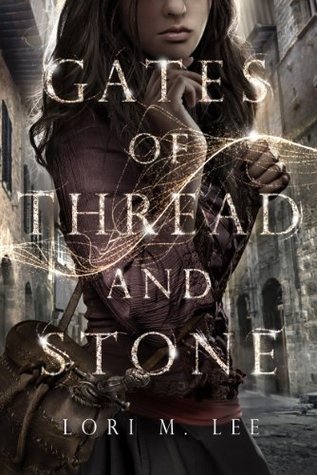
"Death lived in a glass tower at the center of the white court. I could see the tower from anywhere in the city. It cut the skyline like a blade. Death--she probably had a real name--was Kahl Ninu's right hand and his personal executioner. Or, at least, that's what the rumors said. I didn't really care if they were true so long as it wasn't my head on the chopping block."
So begins Gates of Thread and Stone. Just look at that cover. Isn't it gorgeous? Absolutely beautiful. And the title. There's something very poetic about it, don't you think? And really, the cover sums up the book very well: a very gray world with a little bit of light in it, just waiting to shine through. Let's get down to it.
Kai doesn't have any memories before she was eight, when her adoptive brother Reeve found her by the river of the city of Ninurta and took her in. They've been pretty much inseparable ever since, and both work to earn enough credits to buy their way out of the Labyrinth, the slum-like neighborhood where they live. Kai works as a mail carrier, and Reeve works as a bouncer at a brother. One day, Kai is nearly killed by a strange young woman in an alley--but uses her abilities to control time to severely injure her attacker instead. Just a few days later, Reeve is missing. Desperate to find him, Kai seeks out answers from anyone who could possibly help, and she and her friend/love interest Avan eventually find themselves fugitives from Ninurta, seeking out the Black Rider, who is rumored to have been kidnapping Ninurtans for years.
This book has a very strong start, and a very strong finish. It does not have such a strong middle. There's a lot of momentum at the beginning, with one event leading into the other with just enough breathing space in between. The initial attack on Kai, her use of the strings, Reeve's disappearance, the escape from Ninurta--it's all very dramatic. And then the plot...stalls. Kai and Avan end up in a sort of limbo, just waiting for the next thing to happen. They do some talking. They find out some plot points. They train. But nothing of real impact happens. There is some cool stuff that they find out, and the setting where they do all of this talking/learning/training is neat, but there's not a ton of action, and this action-less time continues for a big part of the book. Once they leave and move on to the next phase of the adventure, the pace picks up a little bit, and then barrels back up to full speed for the climax, and a denouement that is just long enough.
The settings in this book were, I thought, very well done. Ninurta is a city, supposedly the last one left in the world after an apocalyptic event called the "Rebirth," and it is very...gray. Everything in it seems to be gray, except the White Court, where the king and Death, his executioner, live. The sun comes out for exactly one week a year, and those who aren't lucky enough to be connected to the White Court live their lives in various forms of poverty. Despite that, the people of Ninurta are still people. They're not just some ground-down populace on the edge of revolution; in fact, they're not on the edge of revolution at all. They're living their lives, with some trials and tribulations, to be sure, but they're still living. Ninurta is not District 12, which was good, because it was different. There's a tournament setting inside the White Court where kids fight other kids--but it doesn't appear to be to the death, and the kids do it voluntarily, because coming out on top gives them a great career path. All of this is really important, because it means that, despite the fact that Gates is a post-apocalyptic novel, it doesn't really feel like one; the apocalypse was a long time ago, and contributes more to mood than to the structure of the plot. And then there's the castle in the Void, protected by gargoyles, that sprouts up different rooms and wings whenever it feels like, and is composed of lost and forgotten things. There's a real beauty to some of these settings, and they definitely contributed to the mood of the book, as a good setting does. The Outlands and the forest, not so much.
And then there's Kai. Overall, I really liked Kai as a character. She finds herself struggling to make her own choices in situations where the ability to choose really isn't hers, all while wielding a power that no one seems to understand, least of all her. I thought her decisions and motives were believable, and I rarely felt a deep desire to smack her across the face for sheer stupidity, which is a common emotion with me when it comes to YA heroines. While she is a #specialsnowflake, I'm hard-pressed to think of a YA heroine who isn't, and Kai doesn't let it rule her entire existence or spend all of her time fighting it or anything like that; she works it in, and that worked in the story.
And the Infinite...that was some Gaiman stuff, right there, though there are apparently many more Infinite than there are Endless. But I liked it, and I want to see more.
Overall, I really liked this, despite the slow middle, and I think it has a lot of potential for the future books.
3.5 stars out of 5.
No comments:
Post a Comment